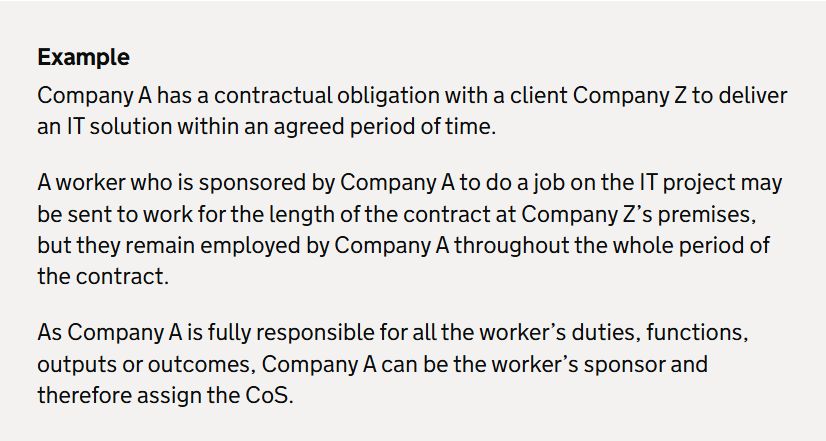- in Asia
- within Energy and Natural Resources topic(s)
- with readers working within the Banking & Credit, Healthcare and Technology industries
The UK's immigration system provides opportunities for employers to sponsor skilled foreign workers under the Skilled Worker visa route. However, employment agencies, businesses, and intermediaries that supply workers to clients face strict regulations when applying for a sponsor licence.
This article explores the rules around sponsoring workers as an employment agency, employment business, or third-party employer, including key compliance obligations, restrictions, and the risks associated with non-compliance.
Can Employment Agencies or Third-Party Employers Sponsor Workers?
Employment agencies and third-party intermediaries can apply for a sponsor licence, but only under limited circumstances. They may only sponsor workers if they are employing them directly in connection with their own business operations.
This means that employment agencies cannot:
- Sponsor a worker with the intention of supplying them to another organisation as labour, regardless of any contractual agreements
- Assign a Certificate of Sponsorship (CoS) for a role in which they will not have direct control over the worker's job duties, salary, or outcomes
The Home Office strictly prohibits the use of the sponsorship system to supply workers to third parties. If an employment agency or intermediary is found to be engaging in this practice, their sponsor licence can be revoked.
Home Office Powers to Refuse Sponsorship
A recent clarification in Home Office guidance states that a sponsor licence application may be refused if there is reason to believe that the employer is operating as an employment agency or business with the intention of supplying sponsored workers to third parties.
This provision is designed to prevent misuse of the Skilled Worker visa system, ensuring that sponsorship is used to fill genuine vacancies within the sponsoring organisation rather than facilitating temporary labour supply chains.
What if a Business Wants to Hire a Worker from an Employment Agency?
Employers who wish to hire a temporary worker who has been supplied to them by an employment agency must meet strict conditions before assigning a Certificate of Sponsorship (CoS). Specifically, they must:
- Have genuine responsibility for the worker's role, duties, and job outcomes
- Directly manage and pay the worker's salary
These conditions ensure that the employer fully controls the employment relationship, rather than acting as a middleman between the worker and another organisation.
Sponsoring Workers on a Contract Basis
In some industries, it is common for companies to contract workers out to third parties. The Home Office recognises this, but has strict guidelines in place to prevent abuse.
A sponsor may assign a Certificate of Sponsorship (CoS) for a worker who is fulfilling a contractual obligation for a third party only if:
- The worker is employed directly by the sponsor
- The worker is providing a specific service or project for a fixed period of time
- The service or project has a definitive end date, after which it will be completed or no longer operated by the sponsor or any other party
Example from Home Office Guidance
The Home Office provides an example of acceptable sponsorship in contract-based work:

Situations Where Sponsorship is Not Allowed
An organisation cannot sponsor a worker if they will not have full control over the worker's job responsibilities, or if any of the following apply:
- The job effectively amounts to hiring out the worker to a third party that is not the sponsor, whether on a temporary or permanent basis, even if there is a contractual agreement in place
- The worker is contracted to perform an ongoing routine role or service for a third party that is not the sponsor, regardless of the length or nature of the agreement
If the Home Office determines that a sponsor is supplying workers as labour to another organisation for routine roles, or that the sponsor does not have full accountability over the worker's duties and job outcomes, the sponsor licence may be revoked.
Final Thoughts
It is essential for employment agencies, businesses, and intermediaries to fully understand the sponsorship rules to ensure compliance with the Home Office's requirements. Failure to adhere to these regulations could lead to licence revocation or refusal of future applications.
Sponsors must always ensure they have genuine control and responsibility over any sponsored worker to maintain their compliance and ability to employ migrant workers legally.
The content of this article is intended to provide a general guide to the subject matter. Specialist advice should be sought about your specific circumstances.

